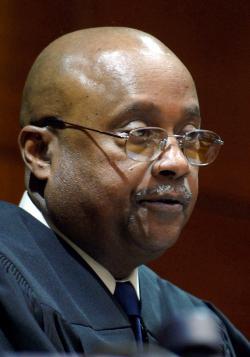Over the course of this year, Viewpoint has covered all kinds of stories about judges and the decisions they render—good, bad, and ugly. Sometimes the good decisions are new and innovative—a step forward in civil rights or economic justice. Sometimes they are just a reaffirmation of longstanding principles. After 25-plus years as a lawyer, prosecutor, and defense attorney, I have developed a deep appreciation for both the wisdom of the law and the role that jurists play in framing the rights and responsibilities that define our society.
What is it that makes a good judge? There is no one-dimensional answer, of course. But today I had the sad responsibility of delivering a eulogy for a good judge, an individual I appointed to New York’s highest court in 2007.
Judge Ted Jones first came to my attention in 2005, when he presided over litigation surrounding a New York transit strike. If there was a thankless task, that case defined it. But with clarity of purpose, Judge Jones presided over this controversy just as he had over countless others: firmly and fairly. In the midst of the storm of voices, claims, and upset that define an event of this magnitude, Judge Jones was the voice of calm, of reason, and he was unquestionably in charge. Demeanor matters, and judicial demeanor is quite distinct from what may be appropriate in other arenas.
It was not until December 2006 that I met Judge Jones. I had been elected governor, and I had the unique privilege of filling a vacancy on New York’s highest court. When Judge Jones came in for his interview, I could tell what he was thinking: There is no way you are nominating me for this position.
Truth be told, I was thinking pretty much the same thing. Why? He didn’t have any of the traditional privileged pedigree in terms of college, law school, big-firm practice, or service as a prosecutor in an elite office.
What did he have? He had grown up on the streets, worked his way through college, was ROTC and served in Vietnam—rising to the rank of captain, brooked no excuses for failure, and had an abiding sense of fairness.
When he walked out of my interview with him, I can tell you exactly what I was thinking: That is precisely who I plan to nominate to New York’s highest court. He had the character, the demeanor, the learning, the toughness, the intellect, the sense of justice, the understanding of people, the certainty of where he came from and how he got where he is that are all central to making a wonderful judge.
Some people think that as you make your way up the ladder of success, you have to choose sides. Not Judge Jones. For him, there was only one side, and that was the side of justice. And you have not achieved justice if you have not gotten there fairly.
All of that is what makes a good judge. We need more jurists like Judge Jones. And I will miss him dearly.
